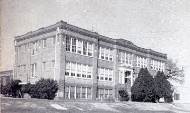Milam County Historical Commission
Milam County, Texas
Milam County, Texas






Milam AgriLife Pioneer Honored
by Jeanne Williams
Temple Daily Telegram - March 11, 2012
CAMERON - It is no secret that Texas 4-H roots grow deep in Milam County, but a Cameron
woman was one of the pioneers who not only helped the youth program bloom into a
statewide effort, but taught practical information and household management skills to
the county’s homemakers.
Edna Westbrook Trigg of Cameron was hired by the extension service in 1912 as the first
home demonstration agent in Texas and set the standards for others during the 100 years
of the program.
Trigg and Milam County were showcased by Texas AgriLife Extension last week with a
historical marker on the Milam County Courthouse square recognizing Trigg’s
contributions to extension programs.
“We owe a great debt to educational pioneers like Edna Westbrook Trigg, who was hired
in 1912 to bring hands-on instruction to people who otherwise would have had little or
no access to it,” Nancy Granovsky, AgriLife Extension family economics specialist in
the family and consumer sciences program, said in an extension press release.
“Today the agency and other system entities have hundreds of professionals and
paraprofessionals who have followed in Trigg’s footsteps and now serve hundreds of
thousands of Texas residents each year.”
Through the first half of the 20th century, home demonstration agents such as Trigg
visited rural Texas homes dolling out practical demonstrations and advice on vegetable
gardening, canning, sewing, cooking, household management, family health, poultry-
raising and other aspects of daily life, Granovsky said.
“This all started with Edna Trigg,” she said.
Practical demonstrations in homes were often one of the only ways women in rural Texas
could acquire the information and skills needed to improve their lives, she said. “In
those days, women were not only responsible for maintaining the household and raising
the children, but also taking care of other chores, maintaining family health, tending
the vegetable garden, feeding the chickens and collecting the eggs,” Granovsky said.
“Some women were able to apply skills they learned from home demonstrations toward
starting a home-based business, like selling eggs, in order to supplement household
income. This gave them an even greater sense of accomplishment and self-worth.”
Trigg, who died in 1946, was a teacher and principal of the small rural Liberty School
when approached in 1911 by a representative of the U.S. Department of Agriculture to
serve as a home demonstration agent for Milam County, according to the Texas State
Historical Association.
The duties of the position, which would start the following year, were to be conducted
during evenings and weekends in addition to her existing school responsibilities. Her
salary would be $100 per month, out of which she would pay work-related expenses,
including room and board.
“Much of Edna’s work involved traveling alone to remote areas of the county by horse
and buggy and staying overnight in strangers’ farmhouses,” said Dr. Jennie Kitching,
who retired as AgriLife Extension’s associate director for human sciences in 1998. “A
lot of what she demonstrated was self-taught or came through personal experience.”
Trigg’s primary duty as collaborator was to coordinate, organize and supervise Girls’
Tomato Clubs throughout the county and put on practical demonstrations about the
production and canning of tomatoes.
Club members, consisting of girls 10-18 years of age, grew tomatoes on small plots of
land and sold or canned them. The first efforts were so successful that in the summer
of 1912 the Milam County girls’ clubs coordinated with area Boys’ Corn Clubs - both
clubs precursors to present-day 4-H clubs - and presented the first-ever exhibit in
Texas to show girls’ agricultural products, which included tin cans and glass jars of
tomatoes and peaches.
“One of the biggest challenges for early home demonstration agents was being accepted
by the families and the community,” Kitching said. “But since Edna Trigg was a married
adult and a mother, as well as a school teacher and principal, she was finally accepted
as a respected and trust-worthy individual.”
Today, AgriLife Extension family and consumer sciences agents still do the things Trigg
did in her day, including working with youths, providing food preservation and safety
programming and nutrition education, said Cheryl Walker, AgriLife Extension family and
consumer sciences agent for Milam County.
Though extension education has changed and expanded over the years, the profession will
always owe a great debt to Trigg.
“She set the pattern for other home demonstration agents and those of us in the family
and consumer sciences profession who came after them, setting the bar pretty high for
the rest of us,” Walker said.
Trigg’s daughters also took her advice about education, and one of them, Eloise Trigg
Johnson, followed in her mother’s footsteps by becoming a home demonstration agent in
Eastland County. In her 20-plus year Extension career, Johnson also served as a family
life education specialist at Texas A&M headquarters.
In 1915, funding ran out for the Milam County position. In 1916, Trigg was hired by the
extension service as a home demonstration agent for Denton County.
Some of Trigg’s most important work in Denton County was during World War I, when she
played a key role in helping make the county agriculturally self-sufficient by working
with area farmers to grow more vegetables.
Home demonstration agents also helped rural Texans get through The Depression when more
families were forced to produce and preserve more of their own food, stretch their
financial resources and make their own clothes, Kitching said.
“During World War II, they were often out in the community helping with scrap drives
and assisting with establishing home victory gardens, food budgeting and promoting
sound nutrition,” she said. “In the 1960s, they were in the forefront of addressing
senior issues.”
Home demonstration agents also frequently obtained books, pamphlets and other
educational materials and made them available to rural residents, Kitching said.
“In my opinion, the value of the home demonstration agent to Texas history cannot be
calculated,” Kitching said. “They were instrumental in the development of a middle
class in the state, as their work was vital in showing families how to improve their
everyday lives. You also can’t underestimate their self-confidence in traveling alone
to rural areas to bring information, social contact and a better way of living to women
and families throughout the state.”
In December 1991, Trigg was inducted into America’s Agricultural Hall of Fame.
jwilliams@tdtnews.com
For more information: Edna Westrook Trigg Historical Marker
.
All articles from the Temple Daily Telegram are published with the permission of the
Temple Daily Telegram.
All credit for this article goes to
Jeanne Williams and the Temple Daily Telegram
Temple Daily Telegram.
All credit for this article goes to
Jeanne Williams and the Temple Daily Telegram